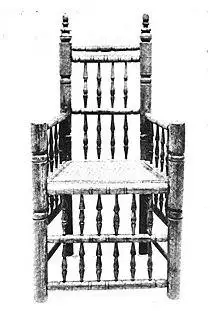
A Brewster Chair is a style of turned chair made in mid-17th-century ("Pilgrim Century") New England, United States.
Origin
The "Brewster Chair" was named after Willam Brewster, one of the Pilgrim fathers who landed in Plymouth, Massachusetts in 1620. In 1830 the Brewster family of Duxbury donated Elder Brewster's original chair to Pilgrim Hall Museum in Plymouth, where it remains today. His chair was created in New England between 1630 and 1660 of American white ash. Other similar New England chairs from the 17th century have been named after this piece.[2]
In the 1970s, Rhode Island sculptor Armand LaMontagne produced a notorious fake Brewster Chair that fooled the national experts at the Henry Ford Museum, which acquired the piece.[2][3]
Gallery
The Pilgrim Hall Museum owns the original Elder Brewster Chair and Peregrine White cradle.
References
- ^ Nutting, W. (1921). Furniture of the Pilgrim Century: 1620-1720, Including Colonial Utensils and Hardware. Marshall Jones Company. p. 182. Retrieved 2019-08-26.
- ^ a b Nutting, Wallace (1921-01-01). Furniture of the Pilgrim Century: 1620-1720, Including Colonial Utensils and Hardware. Marshall Jones Company.
- ^ "The Brewster Chair and the game of "Fool The Experts"". Henry Ford Museum. April 1, 2000. Archived from the original on 5 August 2010. Retrieved 20 October 2010.
